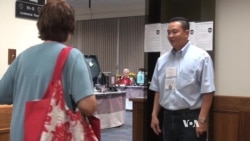The U.S. Supreme Court recently upheld the Texas voter identification law, which requires voters to show an approved form of picture ID in order to vote at a poll. Those who are already registered and who are qualified to vote by mail can still cast a ballot and the state provides free election certificates to those who can prove their U.S. citizenship and residence in Texas. Critics of the law say it puts an undue burden on poor people, minorities, the elderly and the disabled.
Early voting began here in Texas just a couple of days after the U.S. Supreme Court ruled that the state can require voters to show a photo ID to cast a ballot.
Texas Attorney General and Republican gubernatorial candidate Greg Abbott said the law will prevent voter fraud.
“Voter fraud is real and it must be stopped. How can you prove voter impersonation without an ID? You can’t. Which is exactly why it is needed,” said Abbott.
The law's supporters say most democratic countries around the world require voters to show ID.
But critics point out there have been few instances of voter fraud in the U.S. -- and that in Texas, where the state once blocked African-Americans and Hispanics from voting, it is more important to encourage voter participation.
Marianela Acuna of VoteRiders, a non-profit voter advocacy group, said there are many reasons why someone may not have an approved form of identification.
“There are people who need to renew their ID, there are also people who need to get their ID for the first time and do not have documents to prove their name change or their birth,” said Acuna.
Political Science professor Mark Jones at Rice University said around half a million Texans may not have a proper ID to vote.
“Their only option is to get the free election identification certificate the state supplies, but that is not really free because you need a birth certificate to get it, which costs around $25 and you also have to go to a Department of Public Safety office to obtain it, and for someone without a car it is pretty difficult,” said Jones.
Jones said the voter ID law is unlikely to have any impact on major state races, but it could have an impact on some very close local races, including a few here in Houston.
For example, Republican Devon Anderson and Democrat Kim Ogg are in a very tight race for Harris County District Attorney.
“We could have… perhaps a half dozen races that are decided because of the voter ID legislation,” said Jones.
Activist groups like the Texas Organizing Project are fielding volunteers to help people with ID problems and provide transportation to the polls, but they are also encountering voter apathy.
In Texas, it is expected that close to two-thirds of eligible voters will not exercise their right to vote this year even though most of them have an acceptable ID.





